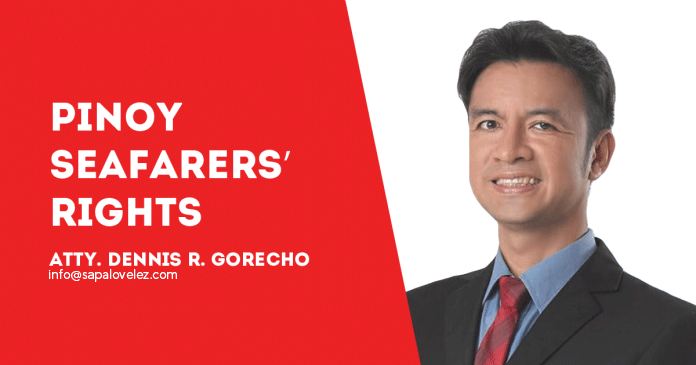
A SEAFARER with a heart illness is considered a “walking time bomb ready to explode towards the end of his employment days.”
Thus declared the Supreme Court in the case of Leoncio vs MST Marine Services Phils. (GR. No. 230357, December 6, 2017) involving a seafarer who was medically repatriated due to coronary artery disease (CAD) and hypertensive cardiovascular disease (CVD).
Time and again, the Supreme Court has held that CVD, CAD, and other heart ailments of seafarers are work-related and, thus, compensable.
Seafarers have a higher rate of mortality, injuries, and illnesses than their counterparts ashore due to their particularly risky working conditions.
Seafarers have to brave storms, typhoons and high waves during the vessel’s journey plus the sudden change of climate and temperature as the vessel cross territories.
Heart ailments of seafarers can be triggered or aggravated by his working conditions aboard the vessel as they can be subjected to physical and mental stress and strain.
Under the POEA Standard Employment Contract, CVD events that are considered as occupational illness include heart attack, chest pain (angina), heart failure or sudden death.
Other common CVDs include coronary heart diseases/ischemic heart disease, cerebrovascular accident or stroke, and hypertension or elevated blood pressure.
A seafarer with a heart illness may claim compensation if the following conditions are met:
(a) when the heart disease was aggravated by reasons of the nature of the seafarer’s work
(b) the severity of the strain of the work may be sufficient and followed within 24 hours by clinical signs of cardiac insult, and
(c) signs and symptoms of cardiac injury appeared during his work and the same persisted.
In most cases, the employer deny its liability for disability compensation by arguing that the seafarer failed to prove the causal connection between his heart diseases and work aboard the vessel. They usually attribute his medical condition to poor lifestyle choices and health habits and was not indicative of work-relatedness.
In the Leoncio case, the Court noted that the seafarer worked with the company for almost two decades and later as a Chief Cook.
The Court stressed that “it is more than reasonable to conclude that the risks present in his work environment precipitated the onset of the acute exacerbation of his heart condition. It is likewise a matter of judicial notice that seafarers are exposed to varying temperatures and harsh weather conditions as the ship crossed ocean boundaries. Worse, they are constantly plagued by homesickness and worry for being physically separated from their families for the entire duration of their contracts. Undoubtedly, this bears a great degree of emotional strain while making an effort to perform their jobs well.”
In granting disability benefits, the Supreme Court acknowledged that seafarers working for companies for long period of time is normally saddled with heavy responsibilities relative to navigation of the vessel, ship safety and management of emergencies. (Magsaysay Mitsui vs Bengson, G.R. No. 198528, October 13, 2014)
One’s responsibilities may cause heavy burdens on a seafarer’s shoulders all these years, and certainly may have contributed to the development of his illness. Any kind of work or labor produces stress and strain normally result in wear and tear of the human body.
Notably, an overseas worker, having to ward off homesickness by reason of being physically separated from his family for the entire duration of his contract, bears a great degree of emotional strain while making an effort to perform his work well. The strain is even greater in the case of a seafarer who is constantly subjected to the perils of the sea while at work abroad and away from his family. (Fil-Pride Shipping vs Balasta G.R. No. 193047, March 3, 2014)
A seafarer normally spend much of his productive years with the company under several employment contracts that were continuously renewed. His years of service certainly will take a toll on his body, and he could not have contracted his illness elsewhere except while working for the company.
In Paringit vs Global Gateway Crewing (G.R. No. 217123, March 28, 2019), the Court awarded disability benefits as it attributed to the seafarer’s diet the heart diseases he suffered. The fats and chemicals in frozen and preserved meats congested his arteries.
Companies will no longer hire a seafarer with medical conditions, especially the high risk of having heart failure or stoke in the future.
From the business point of view, re-employment will be risky since the harsh working environment might only aggravate his fragile condition and in the end expose the company to more serious insurance liabilities.
***
Atty. Dennis R. Gorecho heads the seafarers’ division of the Sapalo Velez Bundang Bulilan law offices. For comments, e-mail info@sapalovelez.com, or call 09088665786./PN



